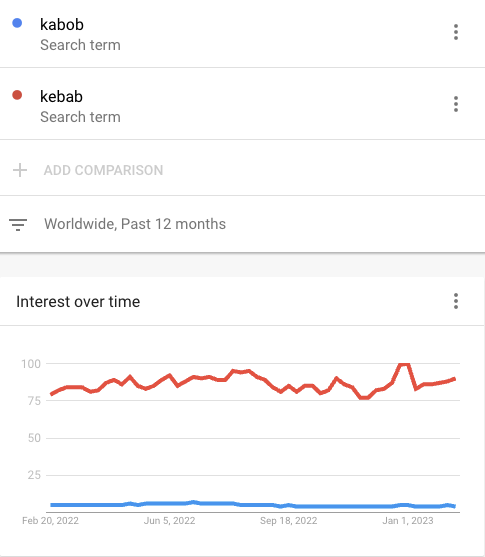The simple answer:
- It’s related to programming.
- I really, really like kabob.
Whenever I start off a new account on a platform, there’s usually a biography or “about me” section. I almost always fill it in with my go-to bio:
“kabob enthusiast.”
Identity is a tricky thing. Depending on the context, audience, and whether or not I’ll care to continue use the service asking me for that information all play into me using this simple statement. It’s low-stakes. To some tiny small percentage of readers who may stumble upon my bio, it might evoke feelings and questions:
Why kabob? What is kabob? I hate kabob. I like kabob. Actually, I’m hungry and would love a piece of pizza instead. Maybe this person is from a place where kabob is a staple.
Once I’ve established that I’m going to continue using a service or platform, I might append some more contextual info to it: Husband. Father. Developer. Engineering Manager. Whatever nouns come to mind that give a bit more about who I am and what I do.
If you can’t beat ‘em, join ‘em
There’s also a bit worth mentioning about the spelling: I’m not fond of “kebab” written out that way. I much prefer ”kabob” — probably because it more closely matches the pronounciation that my U.S. first-generation parents use. However, a quick view on Google Trends reveals a massive preference for “kebab.”

Who am I to buck the trend? Kebab it is.
That explains “Kebab.” But why “Kebab Case?”
If you’re in tech and have dabbled with programming, you’ve probably come across a variety of terms and naming conventions for variables and placeholders. These conventions are intended to make phrases that can’t have spaces a bit easier to read, and I’m sure their usage has launched tons of debates. The ones I know of:
- Pascal case: words that start capitalized, with every subsequent word capitalized (e.g.
ThisIsPascalCase) - Camel case: words that start lowercase, with every subsequent word capitalized (e.g.
thisIsCamelCase) - Snake case: words delimited by underscores (e.g.
this_is_snake_case) - Kebab case: words delimited by dashes (e.g.
this-is-kebab-case)
I also like to think of this blog as a shish kebab of content: a mix of different morsels of vegetables and meats (technical, personal, and professional content) all connected and cooked together on a stick (this site).